|
Hawks create a conflict of heart. They're gorgeous, interesting, and wonderful to photograph because they’ll pose for you. If you’re lucky, you may get a chance to stare into their eyes or experience their shadow flicker over you like a dark ghost as they inspect your property for rodents. They’re amazing creatures, but, well, they eat other birds, or some do. They eat cute bunnies. They eat your squirrels. That’s the thing about the animal kingdom. There’s a lot of killing. Wild life is quite cruel, so when you put up a bird feeder, be prepared. Bird lovers know that there are hawks, and then there are hawks. Like Cooper’s hawks, Sharpies, Harriers, all of whom eat birds. We don’t like them. However, red-tailed hawks eat squirrels, rats, bunnies, mice and sometime bigger birds like ducks, chickens and, well, Cooper’s hawks. They’re OK. Nevertheless, birds scream and send alarms on all hawks, regardless of their preferred meal. I read somewhere in cyberworld database-- where we go with our bird questions-- that one can measure intelligence in the bird kingdom by studying their collection of food. How much thought they put into finding, collecting food can tell you a bit about their bird I.Q. Do they use tools? Are they patient enough to wait for a better meal? Do they plan the food collection and does this planning ever involve other animals of their species? I.E. Do they have a hunting group? If the above were indeed a measure of bird intelligence, I’d say the hawk, particularly the red-tailed hawk, has a high I.Q. I’ve seen them attack in pairs, one chasing a squirrel into an area where its partner waits patiently. I’ve seen a hawk sit in my pine half a day, waiting patiently for prey to come under my bird feeder. I’ve seen a hawk ignore an easy target of food—a dove—in order to obtain a bigger meal—a squirrel. In fact, if patience had a direct relationship to intelligence, then I’d say hawks are geniuses. Because not one thing on earth is as patient as a hawk. OK, so the hawk is smart. But what about their ability to relate to humans? Are they nice? My first response is No. No. No. Hawks are vicious. They love the hunt, not just because they love to eat, but because they simply like killing. A great book about hawks --H is for HAWK by Helen Macdonald—discusses this trait. It’s a terrific book, by the way, if you are looking to understand hawks through the eyes of a falconer. I’m not a fan of the falconer sport (more on that later) but I do believe good falconers like this writer understand hawks. Anyway, yes, maybe hawks are rather scary creatures because of their love of the hunt. But, come on, we humans love to hunt! Human hunters who are in it for the sport of killing exist in every region of our country. Duck hunters. Deer hunters. There are human trophy hunters who travel afar in order to bring a severed head home. So, don’t go accusing the hawk of being this unique killer without recognizing ourselves as killers, too. At least the hawk makes good use of its kill. However, if you’ve seen a hawk kill, you may be wary of them. They eat their prey while it’s still alive. Birds know this, so in the bird kingdom, nothing is more terrifying than a Cooper’s hawk suddenly flying by and landing on a branch near you. Us bird feeders all know when a Cooper’s hawk is around because the birds disappear from the feeder and the birds in the trees freeze like statues. They don’t dare fly, because a Cooper’s hawk specializes in capturing the bird in flight. If you’ve witnessed a Cooper’s hawk capturing a bird, as I have, you will have respect for their acrobatics. If you’re a bird and one of those creatures are around, you don’t dare hit the air. And if you’re a squirrel, you always stay by a tree, because if you’re out in a field or lawn away from any escape route, you're vulnerable to the greatest serial killer of them all--the red-tailed hawk. A red-tailed hawk is able to circle its hunting territory from way up high in the sky--where the airplanes fly. They can reconnoiter like this because of they have 20/5 vision. They see five times farther than we can see. Many people worry about their cats and small terriers when a red-tailed is in the air. But if food is abundant, most experts insist a hawk will not attempt to snatch your pet. It is always a possibility, so anyone owning a pet below, say, 10-15 pounds should keep an eye on them when they’re outside. But for the most part, a hawk doesn’t want to get hurt. A predator hunt is difficult. It requires speed, intelligence, excellent eyesight. Therefore, the body of a predator must be maintained like a well-oiled engine. If attacked and harmed in any way, the hawk will go hungry. They therefore mess with prey they know how to attack. Dogs are problematic. Cats? Depends. Sure, the hawk may grab your chicken, because they don’t understand that the chicken is a business or a pet. They may grab your duck because they have no idea it belongs to your duck farm. This may inspire one to kill the hawk or capture the hawk. Don’t. And this brings us to the Migratory Bird Treaty Act, which are treaties that have been around forever. The Canada treaty was originally signed in 1916. Mexico in 1936. Then Japan and Russia. These treaties apply only to species that have evolved from natural biological or ecological processes, not invasive species placed here by humans. The agreements protect major migratory birds from human interference and prohibit killing, capturing, selling, transporting any birds protected by the Act. And a lot of birds are covered by this act. You can find the list here-- https://www.ecfr.gov/cgi-bin/text-idx?SID=b85587342ebe4f607983dfb6d1e07461&mc=true&node=se50.1.10_113&rgn=div8. You will notice that hawks are one of the species protected by this act. This means that even if the hawk killed your chicken, duck ,or even cat, you cannot kill the hawk. So, don’t even think about it. This protection may be troubling for many chicken farmers or duck farmers or even occasional grieving cat owner. But there are reasons for this protection, important reasons. We humans have placed many barriers to the survival of birds. We’ve overdeveloped. We’ve built structures that interfere with migration. We fly airplanes that sometimes suck birds into their engines. We’ve cut down their homes-- trees. Birds are critical to our ecosystem. They distribute seeds. Some, like hummingbirds, help us pollinate. They naturally clean our environment of waste. They provide food for other species. And they fill our air with song and beauty. If we don’t protect them, we will be in danger of not only losing their contribution to the ecosystem, but also, a piece of ourselves. We already have lost many, by the way. A study that came out in 2019 published by Science Journal estimated that since 1970 1 in 4 birds have disappeared from our land. Weather radar data revealed an estimate 14 percent decline in nocturnal spring-migrating birds in the past decade alone. So, protect your prey from hawks by providing cover, and watching over them. But do not mess with the hawk. Unless you want to simply watch. And maybe engage. I know, I know. Who engages with a hawk, besides falconers?
I walked out and looked up at the tree canopy and noticed about a half dozen jays screaming. When I turned to walk away, there on a lower limb, about nine feet from my face, was one of the largest red-tailed hawks I have ever seen. Gorgeous. Feathers slightly extended. Beautiful, huge torso. Bright green eyes focused only on my eyes. It stared. I stared back. It did not move its eyes off of mine. The eyes were intense, even scary. I thought for a brief moment it was trying to scare me, or perhaps was contemplating an attack because I had ruined a hunt. But, no, it seemed only interested in staring. I backed up a bit and talked in a very soothing voice. “Wow, you’re gorgeous, aren’t you? You know this, though.” She remained perched. She kept staring. I talked a bit more. She stared. I kept my eyes on her. We had a moment. When I first engaged, the blue jays grew louder. But after I started talking to the hawk, the blue jays became quiet. In fact, I remember the yard falling completely still. No sound. Eventually Hawthorne flew off. A few weeks later, the turkeys in my yard crowded around a tree, all looking up. And there she was again. She didn’t like the turkeys so flew to another tree. I followed her and stared. She flew to another and looked back at me as I kept my eyes on her. We had another moment. I kept seeing her perched here and there. I would always say “Hey Hawthorne” every time I saw her. I wanted her to associate “Hawthorne” with our relationship. I made sure I called her in a soothing voice. I figure talking sounds like songs to birds so I make sure my song energy is peaceful. One day, she flew near my yard screaming her hawk scream and landed on a branch across the pond. I was outside at the time. I raised my arms as if I were going to take off and fly and called her name--kind of loud but not scream-y, “Hawthorne! Hawthorne!” She flew right towards me. When I say she flew towards me, she actually flew right at me, veered to my right within ten feet of me and settled upon a low-lying branch of a white pine. She stared at me, I stared at her. I talked to her a bit, gave her my rules. “You want my squirrels? You can have a squirrel if you catch it, but I cannot witness it. I cannot be here when you eat it. If I’m here, I won’t clap my hands at you, but I’ll subtly warn the squirrel. If I’m not here, go for it. You cannot eat any birds.” Of course, she had no clue what I was saying, but she did fly to another branch and sit for a few hours, searching for a squirrel. Early one morning, a week after she flew to me and I gave her my rules, a beheaded squirrel was left on the ground a few feet from my Japanese maple. My husband cleaned it off the ground. Organs were missing but nothing else was touched. She appeared later that day and hopped around the area where she had left the squirrel. The Turkeys surrounded her, so she eventually flew away. I’ve seen her catch one more squirrel, and then witnessed another hawk try to take her catch from her. It tried to attack her, so I walked outside. As soon as I appeared, the competitor flew away. She stayed. Later that day she flew up on a tree limb near me while I stood in my driveway. And we had another moment. I think, or suspect, she was thanking me for walking out and scaring the competitor away. She has also chased a Cooper’s hawk away on two occasions. One chase was right in front of my feeder. The Cooper’s hawk went after a sparrow and Hawthorne went after her. She didn’t catch it, though. Flash forward to March. She disappears I assume to build a nest. Then, one day she appears perched on a pine clearly visible from a window by my computer in my study. She now has a friend. Smaller, leaner, and quite handsome. They perch together. I managed to get a shot, but it’s taken through the window, so it’s not clear. This, I’m convinced, is her mate. As spring approaches, she's not around much--probably busy getting her house ready for the eggs. Then, a few days ago, I see her across the pond hopping about, trying to snatch a small rodent in the dead leaves covering the wetlands. I get my binoculars and check her out. She lifts her head and sees me looking and she’s off, flying to me. Directly to me. She swerves and lands on a low-lying branch right by my head. I look up. She looks at me. I say "Hi, Hawthorne." I talk, she stares. I stand. She perches. We have a long moment. I tell her to do me a favor and catch the Cooper’s hawk because it’s killed a few birds and I’m scared it’s going to eat a blue jay. She turns and flies off.
She's for sure building or even on a nest now. I'll see her again, but it won't be for a few months. Why is this red-tailed hawk engaging with me? Is she curious? Is she mad I am outside scaring away her prey? Or, is she an escaped falconer pet? Even if there's a possibility she used to belong to a falconer, I will not try to find the owner/hunter. Because I do not like that sport. I think it's cruel and entitled. Who are we to put a strap on a bird and tell it to hunt for us? She's free, she's happy. And if I have anything to do with it, she will remain that way. However, I truly don't believe she's an escaped pet. I think she's a determined hunter and sees me and my feeder as an opportunity. She seems to understand that birds are off limits. She seems to get I do not like Cooper's hawks because they eat birds. She's gone after one in front of me. She probably doesn't understand my squirrel rules but figures when I'm gone she can do as she pleases. So, do the birds understand Hawthorne? Have the blue jays changed their behavior around her? At least until nesting season? That’s next.
0 Comments
Leave a Reply. |
AuthorI like to write about people, animals, dogs. I enjoy ideas, good books about ideas, funny books about ideas, funny people who have ideas, advocates for people who don't have voices to express their ideas, and animals who have ideas we can't understand. Archives
November 2021
Categories |
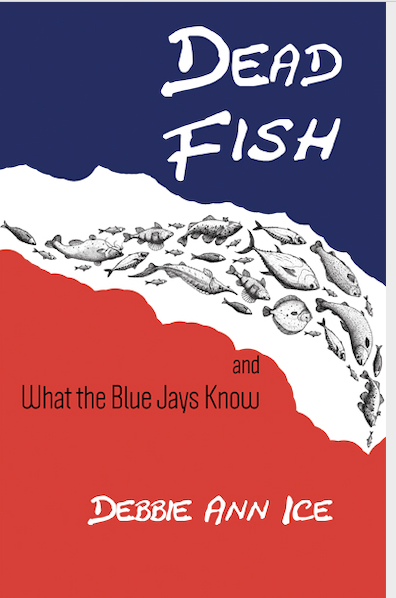
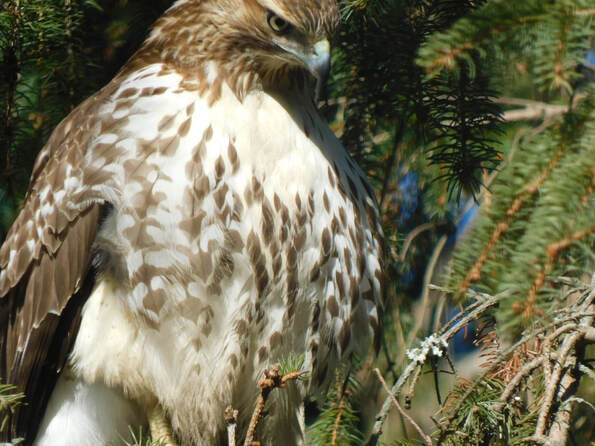
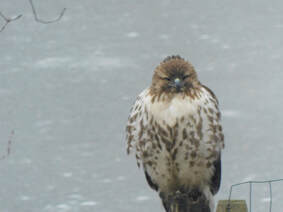
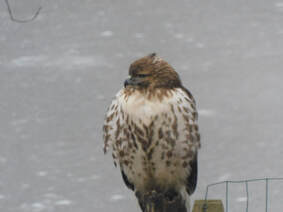
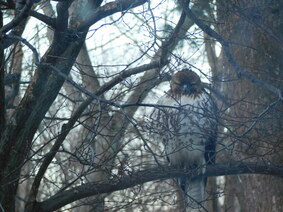
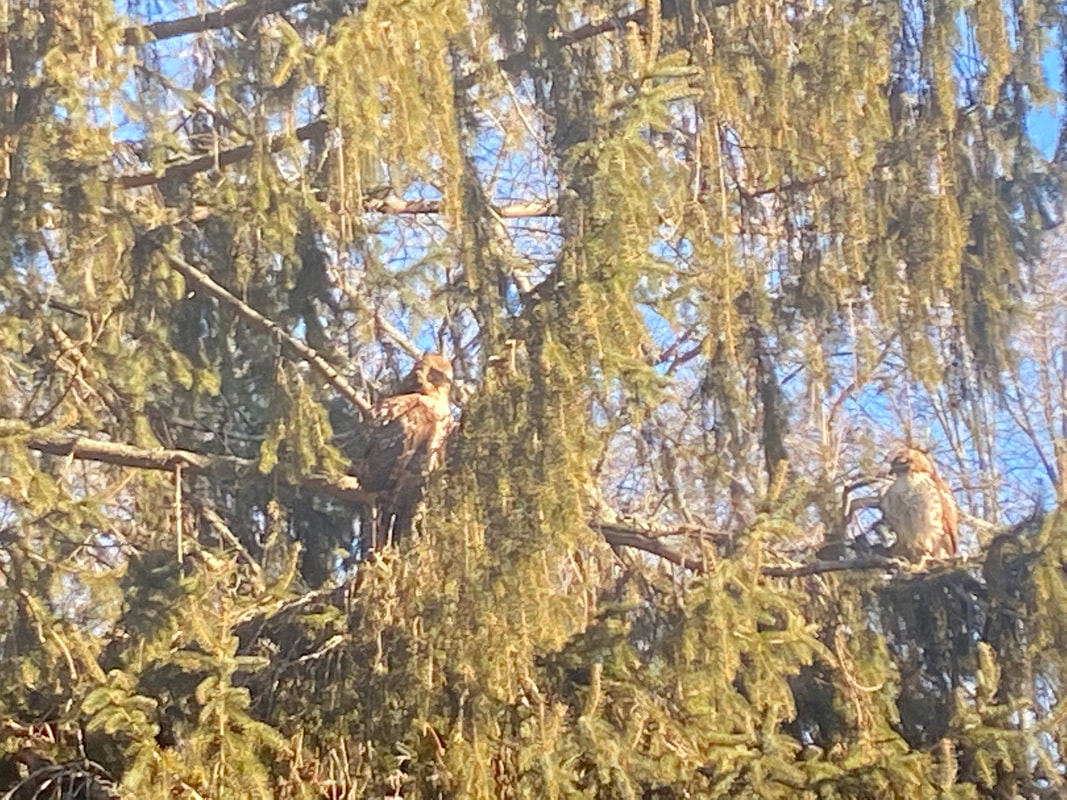
 RSS Feed
RSS Feed